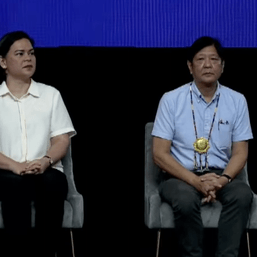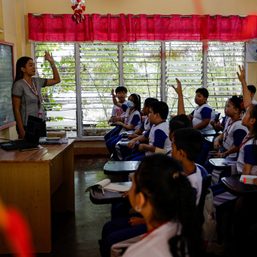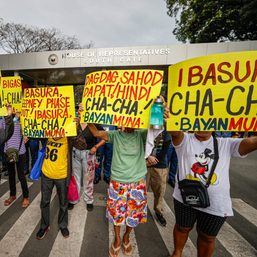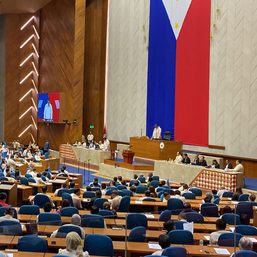SUMMARY
This is AI generated summarization, which may have errors. For context, always refer to the full article.
![[OPINION] Teaching the Constitution: An open letter to the DepEd Secretary](https://www.rappler.com/tachyon/2020/07/open-letter-to-educators-July-30-2020.jpg)
Dear Secretary Leonor Briones,
I reach out to you because I believe that you have an important role, as the Secretary of DepEd, to ensure that the more than 20 million Filipino children enrolled from primary to secondary school in the Philippines learn about the Philippine Constitution. I believe that one of the reasons we see a great divide today among us Filipinos, in our opinion of what is just and what is right, of what democracy or rule of law means, stems from the fact that most of us do not even understand or are not even aware of the rules which we live by, the rules set in our Constitution. These rules are set so we could have a State with enough power to govern but at the same time will acknowledge and protect the fundamental rights of individuals. (READ: FAST FACTS: 1987 Philippine Constitution)
I hope you agree that the guiding principles in our Constitution should be taught as early as possible, and that education plays a great role in making this happen. The teaching of the Philippine Constitution in schools would help raise a generation of more active citizens and leaders of society, especially in a country suffering from decades of inequality. The young generation must be given the opportunity to understand how liberty was and is won, how it can be taken away, and how laws are set to maintain and respect people’s rights. The educational system must help explain the concepts of governance, justice, human rights, freedom, and democracy to young Filipinos.
If you did a survey of ordinary people around the Philippines and asked them where sovereignty resides in our State, how many would answer you correctly? How many of our young Filipinos understand the meaning of “Civilian authority is, at all times, supreme over the military?” How many of us, even older Filipinos, know that our Constitution says, “The State shall develop a self-reliant and independent national economy effectively controlled by Filipinos,” or that the State “guarantees full respect of human rights,” or that it is the State’s duty to “take positive and effective measures against graft and corruption?” How many of us understand the division of power between the executive, judicial, and legislative branch of the government, and why this division is important? What is the purpose of Congress? Of the Senate? Of the Office of the President? Understanding all these would help create more informed voters.
It is likewise stated in our Constitution that “The State recognizes the vital role of youth in nation-building” and shall “inculcate in the youth patriotism and nationalism.” I, therefore, would like to request from your office to include the teaching of the Philippine Constitution at as early an age (both in the elementary and high school curriculum) as possible. And to ensure true learning, you must employ people from different sectors of society as lectors: law professors, public servants, social workers, activists, journalists, law enforcers, and ordinary people whose lives can testify to the importance of understanding the importance of justice and human rights. Most importantly, we must open up dialogues between the younger generation and the older generation where they could discuss and deliberate important questions and issues. (READ: [OPINION] Diagnosing pathologies in the 1987 Constitution)
In Italy, children in primary schools are taught the Constitution and everyone has a copy of it. Young children are advised to “hold on to it” or to keep it. The United States has the National Constitution Center which disseminates information about the Constitution. It provides educational resources for schools, has an educational series online and interactive activities, provides scholar exchanges or dialogues, and has a museum to visit. During Constitution Day and Citizenship Day in the US, schools are required to teach the Constitution.
How many of us know or even celebrate February 2 as Constitution Day in the Philippines? You could designate a single day each year for the teaching of the Constitution or could make it a part of Social Studies class. It is an important measure to take, as the Department of Education is designated with the mission to raise informed citizens who have the capacity to take active roles as protagonists of our democratic society.
We cannot expect a united community if we do not have a clear understanding of our civic identity and our national value. We may have failed in the past to have produced as many informed and active citizens and great leaders as needed by our country, but let us not fail the future generation. There is still hope in the young generation. Giving everyone the knowledge of our Constitution, through teaching and dialogue, is a starting step to ensure a future generation willing to overcome their differences and self-interests and work together to build more just and equal society.
(Signed)
Elisha Gay Cundangan Hidalgo
– Rappler.com
Elisha Gay Hidalgo is a Filipina cultural mediator working in Italy, the wife and daughter of OFWs, and the mother of 3 young Filipino immigrants.
Add a comment
How does this make you feel?

![[The Slingshot] Red zipper on the mouth of Sara Duterte](https://www.rappler.com/tachyon/2024/04/TL-red-zipper-sara-duterte-april-12-2024.jpg?resize=257%2C257&crop=335px%2C0px%2C720px%2C720px)

![[OPINION] How about setting up a heat health warning system in PH schools?](https://www.rappler.com/tachyon/2024/04/heat-health-warning-system-in-PH-schools.jpg?resize=257%2C257&crop_strategy=attention)

![[In This Economy] Economic charter change is very unpopular – it’s time lawmakers listened](https://www.rappler.com/tachyon/2024/04/in-this-economy-charterchange.jpg?resize=257%2C257&crop=292px%2C0px%2C720px%2C720px)

![[OPINION] The First Mode conundrum](https://www.rappler.com/tachyon/2024/03/tl-first-mode-conundrum-03232024.jpg?resize=257%2C257&crop=283px%2C0px%2C720px%2C720px)
![[ANALYSIS] Understanding the demonization of foreign capital](https://www.rappler.com/tachyon/2024/03/foreign-capital-mar-5-2024.jpg?resize=257%2C257&crop=274px%2C0px%2C720px%2C720px)

There are no comments yet. Add your comment to start the conversation.